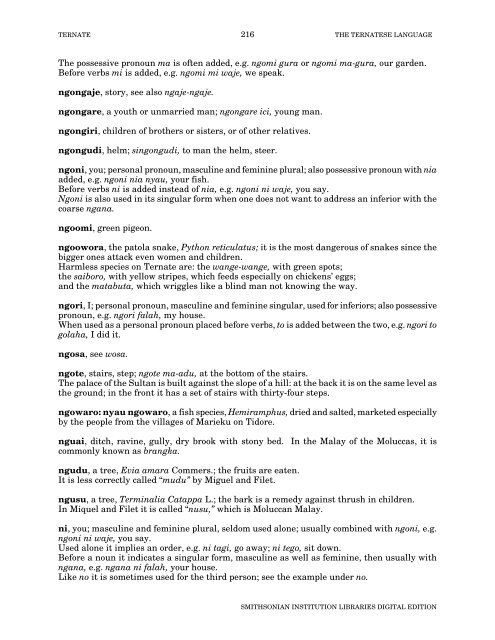Ternate - Smithsonian Institution Libraries
Ternate - Smithsonian Institution Libraries
Ternate - Smithsonian Institution Libraries
Create successful ePaper yourself
Turn your PDF publications into a flip-book with our unique Google optimized e-Paper software.
216<br />
TERNATE THE TERNATESE LANGUAGE<br />
The possessive pronoun ma is often added, e.g. ngomi gura or ngomi ma-gura, our garden.<br />
Before verbs mi is added, e.g. ngomi mi waje, we speak.<br />
ngongaje, story, see also ngaje-ngaje.<br />
ngongare, a youth or unmarried man; ngongare ici, young man.<br />
ngongiri, children of brothers or sisters, or of other relatives.<br />
ngongudi, helm; singongudi, to man the helm, steer.<br />
ngoni, you; personal pronoun, masculine and feminine plural; also possessive pronoun with nia<br />
added, e.g. ngoni nia nyau, your fish.<br />
Before verbs ni is added instead of nia, e.g. ngoni ni waje, you say.<br />
Ngoni is also used in its singular form when one does not want to address an inferior with the<br />
coarse ngana.<br />
ngoomi, green pigeon.<br />
ngoowora, the patola snake, Python reticulatus; it is the most dangerous of snakes since the<br />
bigger ones attack even women and children.<br />
Harmless species on <strong>Ternate</strong> are: the wange-wange, with green spots;<br />
the saiboro, with yellow stripes, which feeds especially on chickens’ eggs;<br />
and the matabuta, which wriggles like a blind man not knowing the way.<br />
ngori, I; personal pronoun, masculine and feminine singular, used for inferiors; also possessive<br />
pronoun, e.g. ngori falah, my house.<br />
When used as a personal pronoun placed before verbs, to is added between the two, e.g. ngori to<br />
golaha, I did it.<br />
ngosa, see wosa.<br />
ngote, stairs, step; ngote ma-adu, at the bottom of the stairs.<br />
The palace of the Sultan is built against the slope of a hill: at the back it is on the same level as<br />
the ground; in the front it has a set of stairs with thirty-four steps.<br />
ngowaro: nyau ngowaro, a fish species, Hemiramphus, dried and salted, marketed especially<br />
by the people from the villages of Marieku on Tidore.<br />
nguai, ditch, ravine, gully, dry brook with stony bed. In the Malay of the Moluccas, it is<br />
commonly known as brangka.<br />
ngudu, a tree, Evia amara Commers.; the fruits are eaten.<br />
It is less correctly called “mudu” by Miguel and Filet.<br />
ngusu, a tree, Terminalia Catappa L.; the bark is a remedy against thrush in children.<br />
In Miquel and Filet it is called “nusu,” which is Moluccan Malay.<br />
ni, you; masculine and feminine plural, seldom used alone; usually combined with ngoni, e.g.<br />
ngoni ni waje, you say.<br />
Used alone it implies an order, e.g. ni tagi, go away; ni tego, sit down.<br />
Before a noun it indicates a singular form, masculine as well as feminine, then usually with<br />
ngana, e.g. ngana ni falah, your house.<br />
Like no it is sometimes used for the third person; see the example under no.<br />
SMITHSONIAN INSTITUTION LIBRARIES DIGITAL EDITION

















